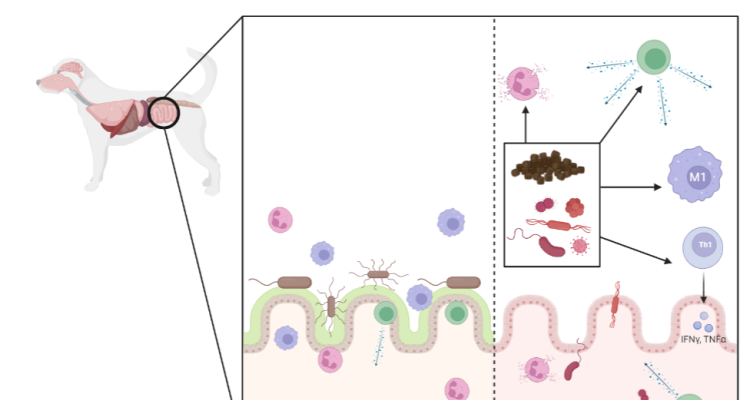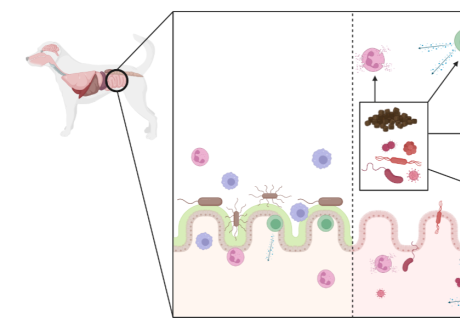
Can canine gut health be improved by using spray-dried porcine plasma powder?
WIAS Magazine – Summer edition 2023
Research Overview
Keywords: gastroenteritis, dog, spray-dried porcine plasma powder
Like humans, dogs can suffer from a variety of gut related diseases. Some of these problems have phenotypes similar to those seen in humans. One type of gut related disease is gastroenteritis, an inflammation of the stomach and intestines caused by, amongst others, bacterial imbalance, viral infection or the presence of allergenic proteins in the food (figure 1). Activation of the immune system leads to damage to local tissue and reduction of the protective mucus and epithelial layer in the intestines. The invasion of bacteria then leads to a positive feedback loop, increasing local damage and causing symptoms like diarrhea, pain, vomiting; all leading to a chronic inflammatory condition.

Figure 1 - Inflammation in the intestine of the dog. On the left, the gut microbiome and mucosal immune system (with e.g. neutrophils, macrophages and T-cells) are well balanced. On the right, the introduction of allergens or irritants in food, an imbalance of the microbiome or the introduction of another pathogenic species (e.g. viruses), leads to activation of the immune system. Immune cells, such as T-cells and macrophages, produce pro-inflammatory cytokines and show phenotypic markers and receptors commonly associated with a pro-inflammatory phenotype (M1 macrophages, Th1 cells). Additionally, the reduction or absence of the mucus layer only enhances (local) inflammation.
Classification of chronic gastroenteritis is done based on the response to different types of treatment. Currently, there are 4 different types: food-responsive, antibiotics-responsive, immunosuppression-responsive and non-responsive. While the first two types can easily be treated, respectively by an exclusion diet to get rid of allergens, or antibiotics, the other two types of gastroenteritis are difficult to treat and both will lead to a reduction in life expectancy.
One alternative treatment type that might help in the more difficult to treat versions of chronic gastroenteritis are nutraceuticals: food components that have immunological effects. An example is cow’s milk: unpasteurized cow’s milk contains bovine immunoglobulins, which are able to modulate immune responses in humans (1). Spray dried porcine plasma powder (SDPP) is another potential nutraceutical. Here, the spray drying of porcine blood leads to a protein powder that can easily be incorporated in kibble. It is currently used in feed for both weaning pigs and calves, where it has been shown to enforce the immune system and feed intake (2). A positive effect of porcine plasma on growth, feed intake and the gut immune system has also been seen in gilthead sea bream and broilers (3, 4). Additionally, some recent papers on the effect of porcine or bovine plasma on rats and mice with induced intestinal problems have shown its capacity to dampen local inflammation, reducing the severity of symptoms seen in these small model animals (5, 6). This leads to the hypothesis that porcine plasma may be able to enhance the gut health of dogs.
My project focuses on the potential mechanisms behind its anti-inflammatory potential, how best to incorporate SDPP into the canine diet while retaining its bioactivity and whether the in vitro results will match what we see in an in vivo pilot study. Throughout the project, focus will be put on the antibodies present in SDPP, as we expect these to mainly be responsible for immunological potential. SDPP’s interaction with canine pathogens and canine immune cells is key in determining the mechanisms responsible for anti-inflammatory capacity.
The broadness of the project and the expertise and diversity of the supervisory team will help me to learn more about both veterinary and cross-species immunology, canine food production and general techniques and jargon used in animal nutrition. One of the main challenges of this project will probably be the lack of material available for canine immunology. Additionally, less is known about the composition of the immune system of dogs than about humans and model animals. However, this challenges us to use different methods and think outside of the box when designing experiments. So far, the lectures, courses, (PhD) activities and people here in Wageningen inspire me to learn more, and I hope to contribute to both the community and Wageningen’s academic standing during my time here!
Sources
Ulfman LH, Leusen JHW, Savelkoul HFJ, Warner JO, Van Neerven RRJ. Effects of Bovine Immunoglobulins on Immune Function, Allergy, and Infection. Front Nutr., 2018;5:52.
Hulst M, de Wit A, van Doremalen A, Heres L, van Vuure C. Mechanistic study on spray dried plasma as an alternative against weaning diarrhea. Poster session presented at: 24th IPVS; 2016 7-10 June; Dublin.
Vallejos-Vidal E, Reyes-Cerpa S, Tort L, Polo J, Reyes-López FE, Gisbert E. Spray-Dried Porcine Plasma Promotes the Association Between Metabolic and Immunological Processes at Transcriptional Level in Gilthead Sea Bream (Sparus aurata) Gut. Front Mar Sci, 2022;9:814233.
Campbell JM, Crenshaw JD, González-Esquerra R, Polo J. Impact of spray-dried plasma on intestinal health and broiler performance. Microorganisms, 2019;7:219.
Moretó M, Miró L, Amat C, Polo J, Manichanh C, Pérez-Bosque A. Dietary supplementation with spray-dried porcine plasma has prebiotic effects on gut microbiome in mice. Scientific Reports, 2020;10:2926.
Hernández-Chirlaque C, Aranda CJ, Ocón B, Polo J, Martínez-Augustin O, Sánchez de Medina F. Immunoregulatory Effects of Porcine Plasma Protein Concentrates on Rat Intestinal Epithelial Cells and Splenocytes. Animals, 2021;11:807.





